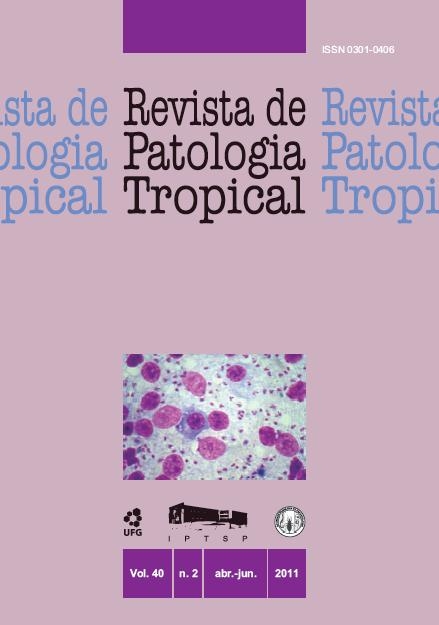Estudo da leishmaniose visceral canina no município de Goiânia, Goiás, Brasil
DOI:
https://doi.org/10.5216/rpt.v40i2.14941Palavras-chave:
Leishmania infantum chagasi, Saúde pública, Diagnóstico molecular, Exame parasitológico, Reservatório urbano, Reação de imunofluorescência indireta.Resumo
A leishmaniose visceral (LV) é uma zoonose causada por Leishmania infantum chagasi. Canídeos desempenham importante papel epidemiológico por atuarem como reservatórios naturais. Este trabalho teve como objetivo conduzir uma investigação sobre leishmaniose visceral canina (LVC) em cães na cidade de Goiânia-GO. Para o estudo, foram utilizados 214 animais sintomáticos e assintomáticos e colhidas amostras de sangue, biópsias de pele e aspirados de linfonodo. Nos testes sorológicos pela reação de imunofluorescência indireta (RIFI), 20 animais apresentaram resultados positivos. No exame parasitológico direto, foram detectadas amastigotas em seis amostras. Os testes pela reação em cadeia da polimerase (PCR), realizados apenas nos animais sintomáticos ou com resultado positivo em pelo menos um dos exames anteriores (n=81), foram positivos para sete cães. As amostras positivas no exame parasitológico foram também submetidas à PCR. Das 20 amostras positivas nos testes pela RIFI, apenas sete foram confirmadas pela PCR. Os resultados positivos pela PCR espécie-específica, nas sete amostras, confirmaram a identidade molecular de L. i. chagasi nestes animais. Os resultados registraram os primeiros casos autóctones em Caldas Novas-GO e Novo Brasil-GO e evidenciaram a necessidade urgente de intensificação das estratégias de controle da LVC nestes municípios. O estudo revelou a existência de casos de LVC em cães que buscam atendimento clínico na cidade de Goiânia.
Downloads
Downloads
Publicado
Como Citar
Edição
Seção
Licença
The manuscript submission must be accompanied by a letter signed by all authors stating their full name and email address, confirming that the manuscript or part of it has not been published or is under consideration for publication elsewhere, and agreeing to transfer copyright in all media and formats for Journal of Tropical Pathology.

